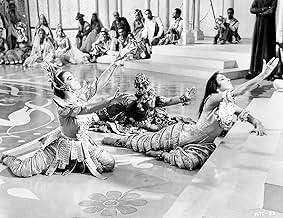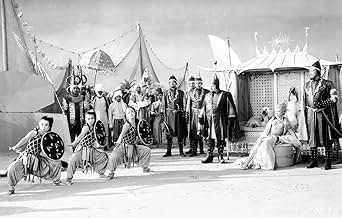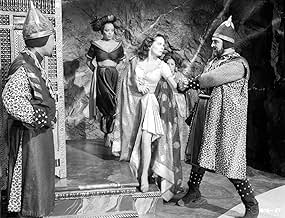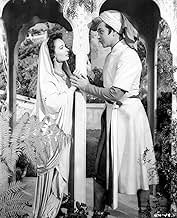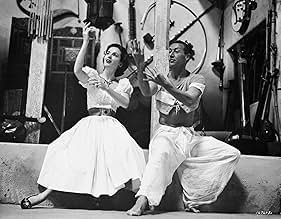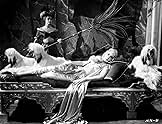AVALIAÇÃO DA IMDb
6,3/10
1,8 mil
SUA AVALIAÇÃO
Adicionar um enredo no seu idiomaA roguish poet is given the run of the scheming Wazir's harem while pretending to help him usurp the young caliph.A roguish poet is given the run of the scheming Wazir's harem while pretending to help him usurp the young caliph.A roguish poet is given the run of the scheming Wazir's harem while pretending to help him usurp the young caliph.
- Direção
- Roteiristas
- Artistas
Ray Aghayan
- Brave Shopkeeper
- (não creditado)
Ed Agresti
- Nobleman
- (não creditado)
Richard Alameda
- Nobleman
- (não creditado)
Suzanne Ames
- Harem Showgirl
- (não creditado)
Jan Arvan
- Manservant
- (não creditado)
William Bagdad
- Wholesaler
- (não creditado)
Ross Bagdasarian
- Fevvol
- (não creditado)
Rama Bai
- Plump Ayah
- (não creditado)
Avaliações em destaque
I saw this movie version and have always loved it. I also saw the stage version, but who could be better than Howard Keel. I felt like a "Stranger In Paradise." I have always been a movie musical buff and a big fan of Mr. Keel. When I first saw the movie as a child, I felt transported back to that time period (even if it was a Hollywood movie). The beautiful music and romance contained within makes you feel wonderful. And you can imagine all the romance, adventure and "Baubles, Bangles and Beads" you could ever wish for and all in the time and space of this lovely movie with beautiful music. Thank you Howard Keel, Ann Blyth, Vic Damone and company for one of my favorite movie memories.
It's hard for me to believe that I saw many of these old M.G.M. musicals when they first came out when I was a teenager. I first saw Kismet with my cousin and sister in Jackson, Mississippi, and we loved it! I don't like repeating myself, but just because a Broadway star is in a hit musical on Broadway doesn't necessarily mean that they are good movie material. They just don't have the following in the movies to support a movie such as movies like Kismet, Hello Dolly, Gypsy, and Kiss Me, Kate which is considered a better movie than it was a Broadway show.
Kismet is glorious entertainment. Howard Keel is perfect as Hajj the Beggar and even though Ann Blyth was too old to be his daughter, you forgive that problem in casting. She never sang better and Vic Damone was great as the Prince. Thankfully, the songs "He's in Love" and "Was I Wazir" was cut from the film, but sadly, even though it was recorded and filmed "Rhymes Have I" was deleted from the movie. This should not have been. Maybe, some day, someone will restore this number in future Videos of Kismet.
You could not have cast anyone better than Delores Gray as Lalume, and the addition of her song "Bored" [not in the original play on Broadway] shows you don't have to be naked and obscene on the screen to get sex across to the audience as she sings her song and nearly seduces Howard Keel right on the spot, and could that woman sing!
The wonderful thing about this movie is that a Broadway orchestra can't bring out the wonderful music as it is really meant to be heard like a movie orchestra can. For the first time you hear all the music in its richest melodies and Howard Keel, Ann Blyth, Vic Damone, and Delores Gray are thousands time better in their performances than the broadway cast could ever be. "And This is My Beloved" is a much better version in the movie than the Broadway rendition which was much too operatic.
I remember that my cousin Margaret looked at me after Howard Keel sang "The Olive Tree" and she said that if her father ever looked at her the way Howard Keel looked at Ann Blyth, she'd run like hell. Let's face it! Any Blyth was old enough to be his lover and not his daughter, but you forgive the producers for the miscast, because as a whole the film is not miscast, but perfect!
It's just a shame that these films can't be seen on the large theater screens today with stereophonic sound the way they "should" be seen. Maybe, someday, someone will get the hint!
Kismet was and is glorious, and I wouldn't have missed it for the world!
Kismet is glorious entertainment. Howard Keel is perfect as Hajj the Beggar and even though Ann Blyth was too old to be his daughter, you forgive that problem in casting. She never sang better and Vic Damone was great as the Prince. Thankfully, the songs "He's in Love" and "Was I Wazir" was cut from the film, but sadly, even though it was recorded and filmed "Rhymes Have I" was deleted from the movie. This should not have been. Maybe, some day, someone will restore this number in future Videos of Kismet.
You could not have cast anyone better than Delores Gray as Lalume, and the addition of her song "Bored" [not in the original play on Broadway] shows you don't have to be naked and obscene on the screen to get sex across to the audience as she sings her song and nearly seduces Howard Keel right on the spot, and could that woman sing!
The wonderful thing about this movie is that a Broadway orchestra can't bring out the wonderful music as it is really meant to be heard like a movie orchestra can. For the first time you hear all the music in its richest melodies and Howard Keel, Ann Blyth, Vic Damone, and Delores Gray are thousands time better in their performances than the broadway cast could ever be. "And This is My Beloved" is a much better version in the movie than the Broadway rendition which was much too operatic.
I remember that my cousin Margaret looked at me after Howard Keel sang "The Olive Tree" and she said that if her father ever looked at her the way Howard Keel looked at Ann Blyth, she'd run like hell. Let's face it! Any Blyth was old enough to be his lover and not his daughter, but you forgive the producers for the miscast, because as a whole the film is not miscast, but perfect!
It's just a shame that these films can't be seen on the large theater screens today with stereophonic sound the way they "should" be seen. Maybe, someday, someone will get the hint!
Kismet was and is glorious, and I wouldn't have missed it for the world!
Given the times we're in and the changing public tastes in music, I'm not sure how well a revival of Kismet as a Broadway show would do today. Certainly the music of Alexander Borodin remains timeless, but a show with an Arabian Nights setting, I'm not sure would go over so well right now.
The Broadway show with Alfred Drake, Doretta Morrow, Richard Kiley, and Joan Diener ran for 583 performances in the 1953-54 season and won a Tony Award. As none of those worthy performers were movie names, Arthur Freed recast the film with MGM players Howard Keel, Ann Blyth, Vic Damone, and Dolores Gray and I've sure got no complaints about any one of them.
But Kismet has an older an more varied history. It was first presented on Broadway as a straight dramatic play in 1911, written by Edward Knoblauch and providing a career role as Hajj the beggar king for Otis Skinner. He must have done the role a gazillion times on Broadway and in touring companies.
Skinner even did two films, a silent and early sound version that I believe are both lost. It then got a film version with Ronald Colman as Hajj and it co-starred Marlene Dietrich, James Craig and Joy Page. Colman spoke the lines in the inimitable Colman fashion, but the music score that Harold Arlen and E.Y. Harburg wrote was singularly bland.
Nothing bland about the themes of Alexander Borodin which Robert Wright and Chet Forrest arranged and wrote lyrics for to provide a far better musical score. Two songs, Strangers In Paradise and Baubles Bangles And Beads were chart toppers in the first half of the Fifties. I well remember as a child hearing both played on the radio a lot.
The plot of the story centers around the nimble tongued Keel as Hajj who gets himself involved in palace politics with the Wazir/Prime Minister of the old Caliphate of Bagdad played by Sebastian Cabot and his wife Dolores Gray who's taken a real fancy to Keel. At the same time the Caliph on one of his nocturnal wanderings of legend has fallen for Keel's daughter Ann Blyth. The Caliph is played by Vic Damone. Both plot elements come together for an inevitable conclusion which I think you can figure out.
Vincente Minnelli did a great directing this old chestnut, impeccably cast with great musical performers. Songwriting because of who inspired it, doesn't get any better than this.
The Broadway show with Alfred Drake, Doretta Morrow, Richard Kiley, and Joan Diener ran for 583 performances in the 1953-54 season and won a Tony Award. As none of those worthy performers were movie names, Arthur Freed recast the film with MGM players Howard Keel, Ann Blyth, Vic Damone, and Dolores Gray and I've sure got no complaints about any one of them.
But Kismet has an older an more varied history. It was first presented on Broadway as a straight dramatic play in 1911, written by Edward Knoblauch and providing a career role as Hajj the beggar king for Otis Skinner. He must have done the role a gazillion times on Broadway and in touring companies.
Skinner even did two films, a silent and early sound version that I believe are both lost. It then got a film version with Ronald Colman as Hajj and it co-starred Marlene Dietrich, James Craig and Joy Page. Colman spoke the lines in the inimitable Colman fashion, but the music score that Harold Arlen and E.Y. Harburg wrote was singularly bland.
Nothing bland about the themes of Alexander Borodin which Robert Wright and Chet Forrest arranged and wrote lyrics for to provide a far better musical score. Two songs, Strangers In Paradise and Baubles Bangles And Beads were chart toppers in the first half of the Fifties. I well remember as a child hearing both played on the radio a lot.
The plot of the story centers around the nimble tongued Keel as Hajj who gets himself involved in palace politics with the Wazir/Prime Minister of the old Caliphate of Bagdad played by Sebastian Cabot and his wife Dolores Gray who's taken a real fancy to Keel. At the same time the Caliph on one of his nocturnal wanderings of legend has fallen for Keel's daughter Ann Blyth. The Caliph is played by Vic Damone. Both plot elements come together for an inevitable conclusion which I think you can figure out.
Vincente Minnelli did a great directing this old chestnut, impeccably cast with great musical performers. Songwriting because of who inspired it, doesn't get any better than this.
KISMET was originally a play by Edward Knobloch written about 1910, and used as a vehicle for many years by the popular Broadway character actor Otis Skinner, playing the role of Hajj, the philosophical thief who saves the Caliph of Baghdad. Skinner even did a silent film version of the play. Two years after his death in 1942 a sound version of the film (in color) was made starring Ronald Colman, Marlene Dietrich, and Edward Arnold. The movie was a success, but nobody realized it would shortly become extremely successful in a new way. A song writing team (Bob Wright and Chet Forrest) constructed a score for KISMET based on the melodies of Alexander Borodin. The score contained such songs that became standards as STRANGER IN PARADISE (from the "Polevetsian Dances" in the opera PRINCE IGOR), BAUBLES, BANGLES, and BEADS, THIS IS MY BELOVED, THIS WAS THE NIGHT OF MY LIFE, and others. Wright and Forrest would do this several times on Broadway (they composed reset themes by Heitor Villa Lobos in another musical, for example) but KISMET was their joint masterpiece. So successful were they at rejuvenating the old Knobloch play, it was eventually revived again in the late 1990s in a new form as TIMBUCTOO (reset from the Califate of Baghdad to the great African trade city).
Eventually the musical came to the attention to the Freed unit at MGM, and Vincent Minelli was chosen to direct this 1955 version. The musical expanded on the play a little. Howard Keel (as Hajj - the name was restored to the original one, not Hafiz as Ronald Colman was named in the 1944 version) is involved at the beginning with Jay C. Flippen as a violent bandit leader who is seeking his son, and whom Hajj suggests will be found in Baghdad. We see Flippen from time to time looking for his missing son. In the end he does find the son (who lives up or down to Flippen's own reputation).
Keel had the right voice for Hajj, as did Dolores Gray as Lalume, the Vizier's bored wife (Dietrich in the 1944 film). Ann Blyth played Hajj's daughter Marsinah (who falls for the Caliph, Vic Damone). The evil vizier was played by Sebastian Cabot, and his rival government figure Omar (played by Harry Davenport in the 1944 film) is now played by Monty Wooley, in his final major movie part.
Actually the musical is livelier than it's critical history suggests. The old creaky play may turn off many critics, but it had some color, and the Borodin-inspired melodies raised it. But like BRIGADOON, Minelli could not shoot the film on location as it would have been incredibly expensive. Possibly the studio sets may have effected how the film was received by the critics. But it is entertaining, and (because of the music) very memorable. If some numbers were cut most of the big numbers were saved. Besides, I'd rather hear Keel sing A FOOL SAT BENEATH AN OLIVE TREE than hear Cabot (a questionable singing talent) try WAS I VIZIR. I don't think Sebastian Cabot even tried to sing once on FAMILY AFFAIR...his was a distinguished speaking voice, not a singing one.
Eventually the musical came to the attention to the Freed unit at MGM, and Vincent Minelli was chosen to direct this 1955 version. The musical expanded on the play a little. Howard Keel (as Hajj - the name was restored to the original one, not Hafiz as Ronald Colman was named in the 1944 version) is involved at the beginning with Jay C. Flippen as a violent bandit leader who is seeking his son, and whom Hajj suggests will be found in Baghdad. We see Flippen from time to time looking for his missing son. In the end he does find the son (who lives up or down to Flippen's own reputation).
Keel had the right voice for Hajj, as did Dolores Gray as Lalume, the Vizier's bored wife (Dietrich in the 1944 film). Ann Blyth played Hajj's daughter Marsinah (who falls for the Caliph, Vic Damone). The evil vizier was played by Sebastian Cabot, and his rival government figure Omar (played by Harry Davenport in the 1944 film) is now played by Monty Wooley, in his final major movie part.
Actually the musical is livelier than it's critical history suggests. The old creaky play may turn off many critics, but it had some color, and the Borodin-inspired melodies raised it. But like BRIGADOON, Minelli could not shoot the film on location as it would have been incredibly expensive. Possibly the studio sets may have effected how the film was received by the critics. But it is entertaining, and (because of the music) very memorable. If some numbers were cut most of the big numbers were saved. Besides, I'd rather hear Keel sing A FOOL SAT BENEATH AN OLIVE TREE than hear Cabot (a questionable singing talent) try WAS I VIZIR. I don't think Sebastian Cabot even tried to sing once on FAMILY AFFAIR...his was a distinguished speaking voice, not a singing one.
This is musically the most glorious Broadway show of them all. in my judgment; and the most opulent of all filmed musicals in its sound, lyrics and colorful presentation. Of course, it might have been made differently, or better, or smaller or larger. But I am personally glad, as its biggest fan, and as writer, singer, songwriter, critic and moviegoer, that the film was made as honestly as it was. To begin with, the cast is vocally (unarguably) very fine; the two songs omitted, "Was I Wazir" and "He's in Love" were stage songs, without movement and needed omitting. The direction by Vincente Minnelli is very solid and generally fine, the use of color unprecedented. And this film has Howard Keel's best movie role ever, Ann Blyth lovely and seemingly young as his daughter, Sebastian Cabot as the wicked Wazir, Jay C. Flippen as his bandit father, suggestively sexy Dolores Gray as Lalume, and Vic Damone as the lovestruck very-young Caliph. The film's story-line follows the revived stage-play which was adapted to musical purposes in the early 1950s, for Broadway. The main storyline involves an ingenious but penniless poet, a maker of rhymes, who has a daughter; she wants a better life, he wants a better life for her. He finds gold, which a famous bandit claims as his own; but the gold buys him instant wealth; his arrest because he cannot account for the wealth nearly gets him killed; but he sells the idea that he is a magician to the Wazir and fortune favors his predictions. Four other strands are also interwoven in the deft and very entertaining plot. His daughter has met and fallen in love in a garden with the young Caliph without recognizing him; the wicked Wazir of the empire is pressing the young ruler to marry one of the Wazir's choices for monetary advantage; the Wazir's sexy favorite wife falls in love with the poet; and the bandit chief is seeking his long-lost son, who turns out to be the wicked Wazir. All the strands meet when to save his daughter from being forcibly married to the Wazir (to keep her from the Caliph who is still searching for her), the poet tries to drown the Wazir who has had his bandit father murdered when he's found him,and the Caliph alone can set things to rights when he discovers what his true enemy has been plotting. The poet accepts banishment--with Lalume--at an oasis, the daughter marries the Caliph, and the story ends in a splendid wedding. Robert Wright adapted the songs from the music of Aleksandr Borodin. Charles leader and Luther Davis get the credit for the literate screenplay; The sterling cinematography was done by Joseph Ruttenberg, art direction by Cedric Gibbons and E. Preston Ames, with set decoration by F. Keogh Gleason and Edwin Willis. Tony Duquette created the elaborate costumes for this Arabian Nights romp with hairstylings by Sydney Guilaroff and makeup by William Tuttle. Some of the lovely songs from this show are among the brightest lyrics and most beautiful melodies in Broadway--and Hollywood--history. The showstoppers are "Stranger in Paradise", "This is My Beloved", "The Olive Tree", "The Song of the Hand", Not Since Nineveh", Baubles, Bangles and Beads", "Night of My Nights", "Sands of Time" and "Rahadlakum". Among the performers, Dolores Gray is incomparable in the part, and Howard Keel very good in every respect. Among the others involved, Jack Elam, Ted de Corsia, Monty Wolley, and Flippen contribute good work. With a bit more money to expend, outdoor locations could have expanded the film. But most viewers who discover this film fall under the spell of its opulent and beautifully-pacing opening and find the production, as do professionally and personally, very enjoyable indeed.
Você sabia?
- CuriosidadesIt was Vernon Duke who suggested Bob Wright and Chet Forrest use the music of Aleksandr Borodin as a basis for their score.
- Erros de gravaçãoPrior to the start of "Not Since Nineveh", Dolores Gray takes the gold purse from the Wazir to throw coins. When she's finished, she tosses it back to Sebastian Cabot which the actor fumbles and drops at his feet. During the song, the bag disappears and reappears at times and ends up behind his feet. It finally disappears by the end of the dance.
- Citações
Chief Policeman: [the Poet has just been sentenced by the Wazir, and the Chief Policeman enters to find him and Lalume, the Wazir's wife, kissing] What kind of a sentence did he get?
- ConexõesFeatured in MGM Parade: Episode #1.12 (1955)
- Trilhas sonorasOverture
(uncredited)
Music and Lyrics by Bob Wright and Chet Forrest
Based on Themes by Aleksandr Borodin Performed by the MGM Studio Orchestra Conducted by André Previn
Principais escolhas
Faça login para avaliar e ver a lista de recomendações personalizadas
- How long is Kismet?Fornecido pela Alexa
Detalhes
- Data de lançamento
- País de origem
- Idioma
- Também conhecido como
- Un extraño en el paraíso
- Locações de filme
- Metro-Goldwyn-Mayer Studios - 10202 W. Washington Blvd., Culver City, Califórnia, EUA(studio: made in Hollywood, U.S.A. by)
- Empresa de produção
- Consulte mais créditos da empresa na IMDbPro
Bilheteria
- Orçamento
- US$ 2.692.960 (estimativa)
Contribua para esta página
Sugerir uma alteração ou adicionar conteúdo ausente



